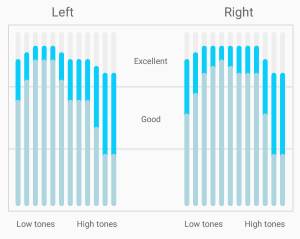 Galaxy S9 adapt sound on Galaxy S9 and S9+ can significantly improve the sound quality of the phone.
Galaxy S9 adapt sound on Galaxy S9 and S9+ can significantly improve the sound quality of the phone.
The improvement is achieved through a personalized sound profile tailored to your ears. Galaxy S9 adapt sound will conduct a hearing test for both of your ears to create that profile and compensate the frequencies you have problems with accordingly so that you can hear the “real” music and sound
This Galaxy S9 guide explains in detail how the adapt sound on Galaxy S9 and S9+ works, and how to enable, customize and use the Galaxy S9 adapt sound to get the best audio quality on Galaxy S9 and S9+.
Please note, adapt sound on Galaxy S9 and S9+ is almost identical to that on Galaxy S10, S10+, Galaxy S8+, S8, Note 10, Note 10+, Note 9, and Note 8. So, this guide also applies to these and other Samsung phones.
What is adapt sound on Galaxy S9 and S9+? How does adapt sound on Samsung phones works?
Adapt sound on Galaxy S9 and S9+ is NOT new. Samsung first introduced adapt sound in Galaxy S4 in 2013.
In the recent launches of Galaxy devices, Samsung even forgot to mention this audio feature, although Samsung tuned this feature in each generation of Galaxy devices.
But in my opinion, the adapt sound is one of the most useful Samsung features. And adapt sound on Galaxy S9 and S9+ is probably the most underused feature.
You should be very excited once you start to use the adapt sound on Galaxy S9 or other Samsung Galaxy phones: how excellent the music can be! You probably will blame yourself: why I didn't use it before!
In a nutshell, adapt sound on Galaxy S9 creates a personalized sound profile (effects) based on your ear.
Every ear is different. Even your two ears may differ significantly in hearing capabilities. At different ages, our ears also have different listening capabilities at different frequencies.
So, the question is: did you hear the “real” music or sound?
Galaxy S9 conducts a hearing test for your ears to create your hearing profile. Then use this profile to compensate the audio output so that you get the “real” music or sound.
For example, if your left ear has problems to hear sounds at around 15KHz, but your right ear does not have any issues for the same frequency range, then normally, you … Read the rest